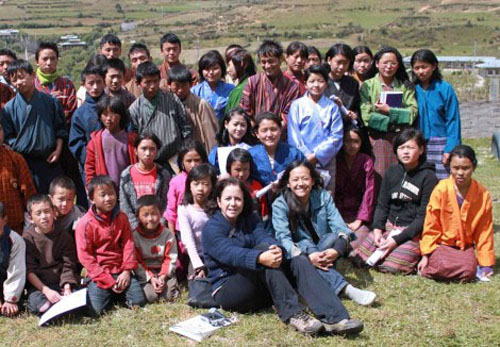
If there were a Shangri-La, the dreamed-of mystical country of James Hilton’s “Lost Horizon,” it would probably be Bhutan. Public radio reporter Lisa Napoli moved there in 2007 to help develop a national radio station to engage Bhutanese youth in the country’s transition from absolute to constitutional monarchy.
Bhutan, a remote Himalayan kingdom, has only been open to visitors since 1974. Bhutan is the only country in the world that measures its success in its gross national happiness rather than its gross national product.
Napoli recounts what she found there and how it changed her in her book “Radio Shangri-La” (Crown Books, 2011). The fourth author in Eduardo Santiago’s 2013, Idyllwild Author Series, Napoli talks about her experience at 3 p.m. Sunday, June 9 at Café Aroma’s upper deck. Admission is free.
Prior to her sojourn in Bhutan, Napoli had established a successful career as a journalist with CNN, the New York Times, MSNBC and American Public Media’s popular radio show “Marketplace.” But, as she noted in this interview, something was missing.
“I knew I needed to change my perspective; not my life but myself,” said Napoli. But traveling to Bhutan was not something in her family background or anything her family understood. “There are always infinite options, choices one can make,” she said. “I knew I wanted to go out and help people, change the way I looked at the world and realize I did not have to be locked into the same job.”
What Napoli said she found in Bhutan was how meaningful and personally rewarding it is to give. “What I learned was not about me and what I had or did not have. It was about giving.”
She went there to help staff and develop Kuzoo, FM (www.kuzoo.net). The government’s purpose in funding this startup was to help the transition to democratic rule and to get young people excited about democracy. As a result of the station’s success, there are now many more radio stations and newspapers in Bhutan, said Napoli. “People have become bold about getting the word out about corruption. Kuzoo played a pivotal part in growing the country’s informational sophistication. It played a critical role in allowing people to imagine and dream.”
Bhutan, unlike most contemporary urban environments, she remembered, was a place tethered in the moment, a place where people had time and took time for each other, a place for conversation and learning. Riffing on the ubiquity of cell phones and personal digital assistant devices, and how they are replacing face-to-face conversations, Napoli said, “I hate the scheduled multi-tasking [in urban America]. I don’t agree with it. Choices have to be made to have real conversations and real friendships. I learned not to be afraid to make those choices.”
Nevertheless, Bhutan too is changing, gradually modernizing with people migrating from farm to city, leaving ancestral families and embracing technology without the comfort of extended family. “It was as life must once have been here,” she said. “There were no places to get prepared food. People had to make things to get their life to work. It required choices.”
Her book chronicles how the time spent in Bhutan altered the way she made choices of where to allocate her resources and what is important in everyday life.
Her fondest memory of Bhutan was a single day when she and a friend experienced something unhurried and very beautiful. “It was a day in a field,” she remembered. “Just the two of us, and everywhere we looked, we were surrounded by butterflies. Whenever I’m stressed, I think of that day. There were so many natural and human moments.”










